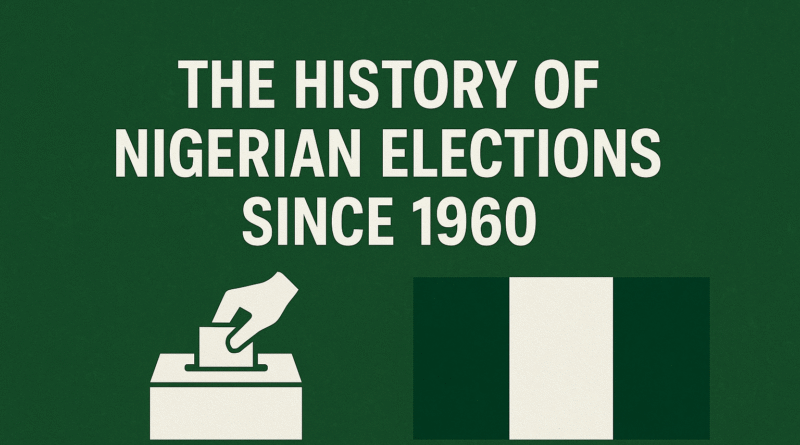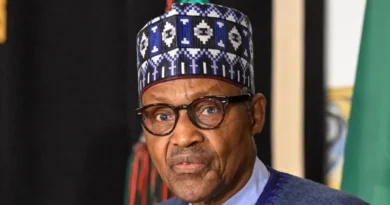The History of Nigerian Elections Since 1960: Nigeria’s Democratic Journey
Elections are the cornerstone of democracy. In Nigeria—a country rich in culture, politics, and population—elections have played a defining role in its national development. From post-independence optimism to military coups, fraudulent ballots, and now digitized voting systems, the road to democracy in Nigeria has been anything but smooth.
This article offers an in-depth look at Nigeria’s electoral history since 1960, chronicling major elections, political shifts, military interventions, reforms, and the fight for free and fair democratic processes.
Nigeria’s Political Evolution: From Independence to the Fourth Republic
✅ Key Milestones
- 1960 – Independence from Britain
- 1963 – Nigeria becomes a Republic
- 1966 – First military coup
- 1979 – Return to civilian rule (Second Republic)
- 1983 – Another coup
- 1993 – Annulled election and crisis
- 1999 – Beginning of the Fourth Republic
- 2023 – Rise of third-force candidates and youth movement
1. The First Republic (1960–1966)
🗳️ Background:
At independence on October 1, 1960, Nigeria adopted a parliamentary system. The country was divided along ethnic and regional lines—North (Hausa-Fulani), East (Igbo), and West (Yoruba)—which heavily influenced political party structures.
🗳️ Key Political Parties:
- Northern People’s Congress (NPC) – North
- National Council of Nigeria and the Cameroons (NCNC) – East
- Action Group (AG) – West
- United Progressive Grand Alliance (UPGA)
🗳️ 1964 General Election:
- Marked Nigeria’s first post-independence election.
- Characterized by violence, intimidation, and boycotts.
- The NPC/NCNC coalition won but legitimacy was questioned.
🗳️ 1965 Western Regional Elections:
- Widespread violence known as the “Operation Wetie” crisis.
- Set the stage for the January 1966 military coup, which ended the First Republic.
2. Military Interregnum (1966–1979)
Following two coups (January and July 1966), the military took full control.
🛡️ Key Military Rulers:
- General Johnson Aguiyi-Ironsi (1966)
- General Yakubu Gowon (1966–1975)
- General Murtala Muhammed (1975–1976)
- General Olusegun Obasanjo (1976–1979)
Under General Obasanjo, Nigeria transitioned to a civilian government through a U.S.-style presidential system, leading to the Second Republic in 1979.
3. The Second Republic (1979–1983)
🗳️ 1979 General Election:
- First presidential election in Nigeria.
- Shehu Shagari (NPN) won, defeating Obafemi Awolowo and Nnamdi Azikiwe.
- Election was moderately peaceful but contested in court.
🗳️ 1983 General Election:
- Shehu Shagari re-elected, but widespread rigging and violence occurred.
- Military coup on December 31, 1983 led by General Muhammadu Buhari ended the Second Republic.
4. Military Rule (1983–1999): The Struggle for Democracy
🛡️ Key Military Leaders:
- General Muhammadu Buhari (1983–1985)
- General Ibrahim Babangida (1985–1993)
- General Sani Abacha (1993–1998)
- General Abdulsalami Abubakar (1998–1999)
🗳️ June 12, 1993 Election:
- Moshood Kashimawo Abiola (SDP) was widely seen as the winner.
- The most credible and peaceful election to date.
- Annulled by Babangida, triggering nationwide protests.
- Sani Abacha took over and ruled until his death in 1998.
🗳️ Legacy of June 12:
- Democracy Day was moved to June 12 to honor Abiola’s sacrifice.
- Regarded as a turning point in Nigeria’s push for true democracy.
5. Fourth Republic (1999 – Present): Return to Civil Rule
🗳️ 1999 General Election:
- Winner: Olusegun Obasanjo (PDP)
- Nigeria returned to democratic governance under a new constitution.
- Marked the beginning of uninterrupted democratic elections.
🗳️ 2003 General Election:
- Obasanjo re-elected for a second term.
- Opposition: Muhammadu Buhari (ANPP)
- Allegations of violence, rigging, and intimidation.
- Nigeria’s democracy was still under watch.
🗳️ 2007 General Election:
- Winner: Umaru Musa Yar’Adua (PDP)
- Noted for serious electoral fraud and mismanagement.
- Yar’Adua admitted the flaws and initiated electoral reforms.
- His presidency was cut short by illness and death in 2010.
🗳️ 2011 General Election:
- Winner: Goodluck Jonathan (PDP)
- Considered an improvement in electoral credibility.
- Violence erupted post-election, especially in Northern states.
🗳️ 2015 General Election:
- Historic Moment: Muhammadu Buhari (APC) defeats incumbent Jonathan.
- First time an opposition candidate won a presidential election.
- Marked a significant democratic milestone.
- Introduction of card readers and biometric verification.
🗳️ 2019 General Election:
- Buhari re-elected amid low voter turnout (around 35%).
- Voting delays, technical issues, and allegations of vote suppression reported.
🗳️ 2023 General Election:
- Winner: Bola Ahmed Tinubu (APC)
- A competitive election with strong third-party momentum from Peter Obi (Labour Party).
- INEC’s failure to transmit results electronically caused credibility issues.
- Legal battles and youth-led political awakening defined the post-election climate.
Nigeria’s Electoral Management Body (EMB): INEC
Independent National Electoral Commission (INEC) has overseen elections since 1998.
🔍 Reforms & Innovations:
- Introduction of PVC (Permanent Voter Card)
- Biometric Registration and Card Readers
- Continuous Voter Registration (CVR)
- BVAS (Bimodal Voter Accreditation System) in 2023
Challenges in Nigeria’s Electoral System
❌ Common Issues:
- Electoral violence
- Vote-buying and ballot snatching
- Fake news and misinformation
- Youth apathy and disenfranchisement
- Judicial interference and slow resolution of election petitions
⚖️ Notable Legal Cases:
- 2007: Yar’Adua’s win contested but upheld.
- 2019: Atiku Abubakar’s challenge against Buhari dismissed.
- 2023: Obi and Atiku challenged Tinubu’s win—court ruling upheld INEC’s declaration.
The Role of Youths and Civil Society
In recent years, Nigerian youths have become more politically active, especially after the #EndSARS movement. Platforms like Twitter, WhatsApp, and Instagram are now tools of political mobilization, voter education, and real-time election monitoring.
🎯 Youth-Driven Initiatives:
- YIAGA Africa
- Enough is Enough (EiE) Nigeria
- The NotTooYoungToRun Bill – Reduced age requirements for candidates.
International Observers and Global Perception
Nigeria’s elections are closely monitored by:
- ECOWAS
- African Union
- EU Electoral Observer Missions
- U.S. and UK Diplomats
While progress has been made, observers continue to call for transparency, digital reforms, and peaceful transitions.
What the Future Holds: A Digital Democracy?
🔮 Trends to Watch:
- E-voting and blockchain-based voting systems
- Diaspora voting rights
- Election financing regulation
- More independent candidacies
- Youth dominance in electoral decisions
Democracy Is a Journey
The story of Nigeria’s elections since 1960 is a story of resilience. From coups to credible contests, and from stolen mandates to peaceful handovers, the country has made enormous progress. However, much work remains to be done—especially in rebuilding trust in the process, increasing participation, and reducing violence.
With each election cycle, Nigeria moves closer to building the democratic nation it deserves. And as awareness, technology, and civic education increase, the power of the people continues to grow.
At Helo.ng, we believe that an informed citizenry is the backbone of a true democracy. Share this article, educate others, and most importantly—VOTE.
For more insightful political coverage, election analysis, and civic education, keep it locked on Helo.ng.



